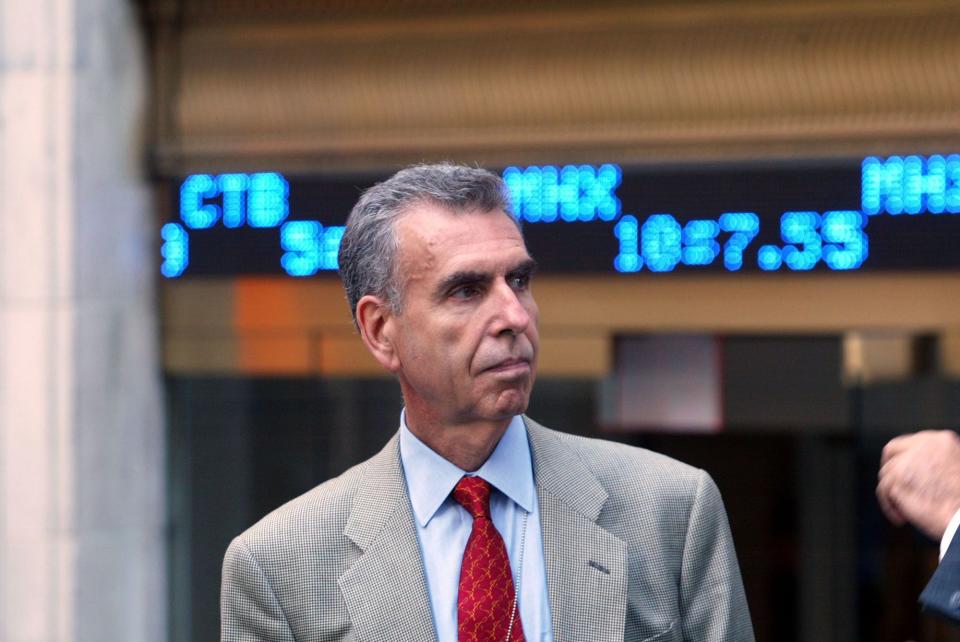Gerald Levin, Who Guided Time Inc.’s Rise and Fall, Dies at 84

(Bloomberg) -- Gerald Levin, who helped lead Time Warner Inc.’s rise into a late 20th century media powerhouse, as well as its disastrous first step into the internet age, has died. He was 84.
Most Read from Bloomberg
Apple Is in Talks to Let Google Gemini Power iPhone AI Features
Trump Rules Out Vivek Ramaswamy as Running Mate as He Eyes New Team
Musk Says His Ketamine Prescription Is in Investors’ Best Interests
Putin Warns Russia Won’t Stop After Predictable Election Win
Levin, who lived in Long Beach, California, passed away in a hospital on Wednesday, the New York Times reported, citing his grandchild Jake Maia Arlow. Levin had been diagnosed with Parkinson’s disease, the newspaper said.
At Time Inc., Levin, an avid runner who quoted Homer, the Bible and Albert Camus, had a hand in turning a fledgling cable operation, Home Box Office, into a pay-for-view giant. He had the breakthrough idea to provide premium content through satellite delivery.
As Time’s chief strategist, Levin orchestrated the 1990 merger of Time with Warner Communications, creating the world’s largest media and entertainment company. Its components included a publishing division producing Time, People and Fortune magazines, a movie studio and a music company.
In his decade as Time Warner’s boss, Levin oversaw the purchase of Turner Broadcasting in 1996, acquiring Cable News Network. He also beat back a takeover by Seagram Co., which had acquired a 15% stake in his company.
But Levin may be remembered more for a disastrous decision: Selling venerable Time Warner to upstart America Online Inc. at the peak of the internet bubble. Levin pitched the 2000 deal as a visionary marriage of old-media assets with the online future.
Disastrous Deal
Instead, he ended up trading solid businesses for AOL, whose high-priced stock had been held aloft more by hope than profit. Faster broadband services, including some owned by Time Warner, quickly eclipsed AOL’s slow dial-up service, the supposed vehicle for digitizing Time Warner’s valuable content.
Making matters worse, AOL’s accounting practices had made its business look healthier than it was. Time Warner later paid $510 million and restated three years of results to settle government charges that AOL overstated its advertiser revenue and subscriber counts.
A decade later, the merged company’s stock, initially valued at $350 billion, including AOL’s new Netscape browser unit, was worth only one-seventh of that amount, according to the New York Times, which noted business schools had taken to studying the deal as the worst ever.
“It’s just a stunning piece of history,” Levin told CNBC on the 10th anniversary of the merger. “And so, I invite business schools to continue to study it.”
Gerald Manuel Levin was born in Philadelphia on May 6, 1939, to David Levin and the former Pauline Shantzer. Levin’s father had a thriving grocery business while his mother was a piano teacher. His family settled in Overbrook Hills, Pennsylvania.
HBO’s Birth
Levin earned a bachelor’s degree in philosophy at nearby Haverford College in 1960 and graduated from the University of Pennsylvania’s law school in 1963, then worked at a law firm and an investment company.
In 1972, cable television pioneer Charles Dolan hired him to draw up the business plan for Home Box Office and secure rights to programming. Time Inc. took over HBO in 1973. Levin, working under then-chief executive officer J. Richard Munro, helped negotiate the 1990 merger with Warner. He climbed the ranks of the combined companies, becoming CEO in 1992 and chairman a year later.
Levin left AOL Time Warner in 2002 after the company posted big losses amid plummeting internet stock values.
Nicknamed Jerry, Levin was married three times. In August 1959, at the beginning of his senior year in college, he married Carol Needleman, a University of Pennsylvania law student. In 1970, they divorced, and Levin married Barbara Riley, an interior designer.
Family Tragedy
The family suffered a well-documented tragedy. In 1997, his son Jonathan, a 31-year-old high school English teacher in the Bronx beloved by his students, was murdered by one of them in his apartment — for the code of his bank card, prosecutors said.
In 2003, Levin married Laurie Perlman, a former talent agent-turned-clinical psychologist. Levin helped Perlman open the Moonview Sanctuary, a health and wellness treatment center in Santa Monica, California.
Levin invested in and became a board member of OrganizedWisdom, an internet-based business designed to collate information from medical professionals to educate consumers with medical concerns. After Levin was diagnosed with Parkinson’s disease in 2006, he and Perlman also opened a center to help patients with the ailment.
Levin’s first marriage produced two children, Laura and Leon, in addition to Jonathan. With his second wife, he had a son, Michael, and a daughter, Anna.
Most Read from Bloomberg Businessweek
China’s Super-Cheap EVs Offer Hope for Average American Buyers
Dollar’s Superpower Status at Risk From Turmoil at Home and Abroad
An Influential Economics Forum Has a Troubling Surplus of Trolls
©2024 Bloomberg L.P.
